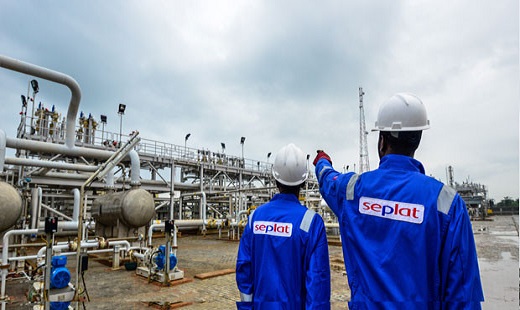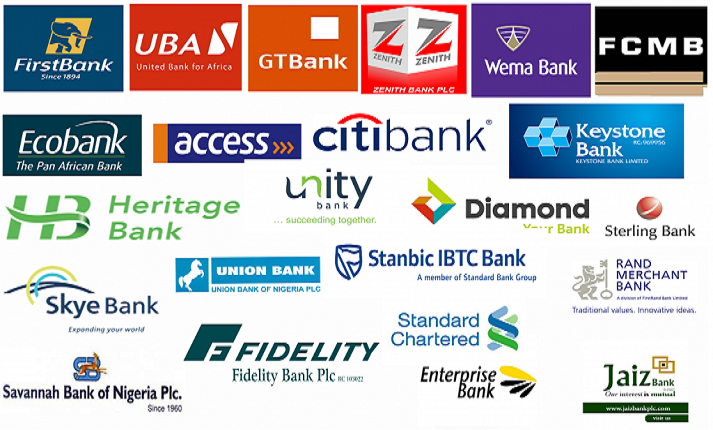Economy
Fitch Returns Nigeria’s Outlook to Stable, Forecasts 2% GDP Growth

**Says Inflation to Remain at Double Digits through 2019
**Debt to Hits 292% of Revenue
**Buhari Expected to Continue Economic Programme if Re-elected
By Dipo Olowookere
The outlook on Nigeria’s Long-Term Foreign-Currency Issuer Default Rating (IDR) has been reviewed upward to stable nearly six months after it was dropped to negative by Fitch Ratings.
In a statement dated November 2, 2018, the global rating agency said it also affirmed its rating on Nigeria at ‘B+’.
According to Fitch, the revision of the outlook on Nigeria’s Long-Term IDRs reflects the ongoing economic recovery and decreasing external vulnerabilities, both supported by increased oil production and higher global oil prices.
It noted that despite setbacks, the Nigerian economy is continuing its slow recovery from the recession that ended in early 2017.
Fitch pointed out that non-oil growth has been supported by an increase in the supply of foreign exchange and will receive an additional boost as the government begins its delayed implementation of the 2018 capital budget.
“Political uncertainty ahead of the general election scheduled for February 2019 may lead to some weakening in growth, but we expect any disruption to be short-lived,” the statement obtained by Business Post said.
It added that the contribution of the oil sector has been positive in the first half of 2018 as oil production, including condensates, has averaged just below 2.1 million barrels per day (mbpd), compared with 1.9 mbpd in 2017.
Fitch said it expects average production of crude oil in Nigeria to remain around 2.1 mbpd through 2018 and 1H19.
Fitch is forecasting a GDP growth of 2 percent overall in 2018, increasing to 2.5 percent in 2019 and 3.3 percent in 2020, and the agency expects that Nigeria’s medium-term growth will average around 4 percent.
It noted that oil production will increase as new exploration and oil infrastructure projects begin to come online, but emphasised that Nigeria will struggle to raise production to the levels envisaged in the 2019-2021 Medium Term Expenditure Framework (MTEF).
Fitch said high inflation has been a rating weakness, but CPI growth slowed to 11.3 percent year-on-year in September 2018, down from a recent peak of 18.7 percent in January 2017.
Inflation fell rapidly in 1Q18, but disinflation has slowed since, as base effects fade and conflicts between herders and farmers affect food supplies.
Fitch said it expects that annual average inflation will fall, but remain in the double digits through 2019.
“Despite falling inflation, Fitch expects that the Central Bank of Nigeria (CBN) will move towards tighter monetary policy to support FX rate stability,” the firm said.
The CBN has kept the monetary policy rate at 14 percent since May 2016, but has conducted monetary policy through its sales of Open Market Operation bills and by managing the reserve ratio.
Foreign currency availability has improved although Fitch believes that it remains a constraint on economic growth. The CBN continues to operate an FX regime with multiple windows and exchange rates, which will not change before the general elections. However, the wholesale interbank FX rate has depreciated, bringing it closer to the rate at the Investors and Exporters window.
Nigeria has increased its stock of international reserves to $44.6 billion (7.2 months of current external payments) as of September 2018, from $37.9 billion at end-2017.
The accumulation of reserves has been a function of both an increase in oil export receipts and an increase in inflow of foreign investments.
The rating agency said Nigeria’s external flows are exposed to global risk sentiments as well as to investor’s views on the country’s political and fiscal developments. However, the build-up of reserves provides a substantial external buffer.
“Nigeria’s ‘B+’ IDRs also reflect the country’s position as Africa’s largest economy and its well-developed domestic debt markets, balanced against low levels of domestic revenue mobilisation and of GDP per capita, a high level of hydrocarbon dependence, and low rankings on governance and business environment indicators.
“Nigeria continues to run persistent fiscal deficits at both the central and general government levels. Fitch forecasts a general government deficit of 4.3 percent of GDP in 2018, approximately the same as 2017.
“The government’s 2019-2022 Medium Term Expenditure Framework envisages a decrease in expenditure following three straight years of increasing capital expenditure. Lower expenditure, as a percentage of GDP, will help the general government fiscal deficit to narrow to 4 percent of GDP in 2019, but the government will continue to experience difficulty in raising non-oil domestic revenue.
“Oil revenue has increased since hitting bottom in 2016, but volatile production levels and inefficiencies within the petroleum sector have limited the transmission of higher oil prices to higher government revenue,” the statement said.
It added that Nigeria’s general government debt will rise to 292 percent of revenue, well above the historical ‘B’ median of 205 percent of revenue, reflecting the accumulation of new debt and the lack of progress on raising government revenue.
At 20 percent of general government revenue, interest payments are already more than twice the ‘B’ median. Federal government interest expenditure to federal government revenue stands much higher at just below 60 percent, the company stated.
“Fitch forecasts Nigeria’s current account (CA) surplus to widen to 3.6 percent of GDP in 2018 as oil export receipts have grown thanks to high oil prices. The CA surplus will narrow in subsequent years as import growth increases following several years of import compression related to tight foreign exchange supply. Nigeria is a net external creditor equivalent to 12 percent of GDP in 2018.
Fitch considers that the easing of foreign-currency liquidity has reduced risks regarding Nigerian banks’ ability to meet dollar liabilities and external debt repayments. However, economic headwinds have continued to affect asset quality.
“Average industry NPLs (according to CBN data) increased to 15 percent at end-2017, reflecting the lag affect from 2015. NPLs are concentrated in the oil and gas sector. The ongoing economic recovery, higher oil prices and widespread loan restructuring is likely to moderately help asset quality, but high NPLs will weigh on private sector credit provision.
“Credit to the private sector returned to modest positive growth in 2018 after tight domestic liquidity and crowding out from government borrowing led to a contraction of 5 percent through November 2017,” the firm said.
It was stressed that the outcome of the upcoming general elections remains uncertain. President Buhari will face a strong challenge from former Vice President Atiku Abubakar, who won the October 2018 primary to be the People’s Democratic Party candidate. Abubakar has made limited statements regarding his economic policy platform, but has criticised the current FX regime and has also signalled his support for devolving more control over public finances to the state governments.
“If Buhari is re-elected, we expect his government to continue implementing the economic programme outlined in the Economic Recovery and Growth Plan released in March 2017.
“Fitch does not expect widespread disruption or instability around the election. However, a flare-up of violence in the Niger Delta around the elections presents downside risk to the fiscal, external and GDP growth forecasts,” the rating agency stated.
Economy
Tinubu Okays Extension of Ban on Raw Shea Nut Export by One Year

By Aduragbemi Omiyale
The ban on the export of raw shea nuts from Nigeria has been extended by one year by President Bola Tinubu.
A statement from the Special Adviser to the President on Information and Strategy, Mr Bayo Onanuga, on Wednesday disclosed that the ban is now till February 25, 2027.
It was emphasised that this decision underscores the administration’s commitment to advancing industrial development, strengthening domestic value addition, and supporting the objectives of the Renewed Hope Agenda.
The ban aims to deepen processing capacity within Nigeria, enhance livelihoods in shea-producing communities, and promote the growth of Nigerian exports anchored on value-added products, the statement noted.
To further these objectives, President Tinubu has authorised the two Ministers of the Federal Ministry of Industry, Trade and Investment, and the Presidential Food Security Coordination Unit (PFSCU), to coordinate the implementation of a unified, evidence-based national framework that aligns industrialisation, trade, and investment priorities across the shea nut value chain.
He also approved the adoption of an export framework established by the Nigerian Commodity Exchange (NCX) and the withdrawal of all waivers allowing the direct export of raw shea nuts.
The President directed that any excess supply of raw shea nuts should be exported exclusively through the NCX framework, in accordance with the approved guidelines.
Additionally, he directed the Federal Ministry of Finance to provide access to a dedicated NESS Support Window to enable the Federal Ministry of Industry, Trade and Investment to pilot a Livelihood Finance Mechanism to strengthen production and processing capacity.
Shea nuts, the oil-rich fruits from the shea tree common in the Savanna belt of Nigeria, are the raw material for shea butter, renowned for its moisturising, anti-inflammatory, and antioxidant properties. The extracted butter is a principal ingredient in cosmetics for skin and hair, as well as in edible cooking oil. The Federal Government encourages processing shea nuts into butter locally, as butter fetches between 10 and 20 times the price of the raw nuts.
The federal government said it remains committed to policies that promote inclusive growth, local manufacturing and position Nigeria as a competitive participant in global agricultural value chains.
Economy
NASD Bourse Rebounds as Unlisted Security Index Rises 1.27%

By Adedapo Adesanya
The NASD Over-the-Counter (OTC) Securities Exchange expanded for the first session this week by 1.27 per cent on Wednesday, February 25.
This lifted the NASD Unlisted Security Index (NSI) above 4,000 points, with a 50.45-point addition to close at 4,025.25 points compared with the previous day’s 3,974.80 points, as the market capitalisation added N30.19 billion to close at N2.408 trillion versus Tuesday’s N2.378 trillion.
At the trading session, FrieslandCampina Wamco Nigeria Plc grew by N5.00 to trade at N100.00 per share compared with the previous day’s N95.00 per share, Central Securities Clearing System (CSCS) Plc improved by N4.18 to sell at N70.00 per unit versus N65.82 per unit, and First Trust Mortgage Bank Plc increased by 14 Kobo to trade at N1.59 per share compared with the previous day’s N1.45 per share.
However, the share price of Geo-Fluids Plc depreciated by 27 Kobo at midweek to close at N3.27 per unit, in contrast to the N3.30 per unit it was transacted a day earlier.
At the midweek session, the volume of securities went down by 25.3 per cent to 8.7 million units from 11.6 million units, the value of securities decreased by 92.5 per cent to N80.7 million from N1.2 billion, and the number of deals slipped by 33.3 per cent to 32 deals from the preceding session’s 48 deals.
At the close of business, CSCS Plc remained the most traded stock by value on a year-to-date basis with 34.1 million units exchanged for N2.0 billion, trailed by Okitipupa Plc with 6.3 million units traded for N1.1 billion, and Geo-Fluids Plc with 122.0 million units valued at N478.0 million.
Resourcery Plc ended the trading session as the most traded stock by volume on a year-to-date basis with 1.05 billion units valued at N408.7 million, followed by Geo-Fluids Plc with 122.0 million units sold for N478.0 million, and CSCS Plc with 34.1 million units worth N2.0 billion.
Economy
Investors Lose N73bn as Bears Tighten Grip on Stock Exchange

By Dipo Olowookere
The bears consolidated their dominance on the Nigerian Exchange (NGX) Limited on Wednesday, inflicting an additional 0.09 per cent cut on the market.
At midweek, the market capitalisation of the domestic stock exchange went down by N73 billion to N124.754 trillion from the preceding day’s N124.827 trillion, and the All-Share Index (ASI) slipped by 114.32 points to 194,370.20 points from 194,484.52 points.
A look at the sectoral performance showed that only the consumer goods index closed in green, gaining 1.19 per cent due to buying pressure.
However, sustained profit-taking weakened the insurance space by 3.79 per cent, the banking index slumped by 2.07 per cent, the energy counter went down by 0.24 per cent, and the industrial goods sector shrank by 0.22 per cent.
Business Post reports that 25 equities ended on the gainers’ chart, and 54 equities finished on the losers’ table, representing a negative market breadth index and weak investor sentiment.
RT Briscoe lost 10.00 per cent to sell for N10.35, ABC Transport crashed by 10.00 per cent to N6.75, SAHCO depreciated by 9.98 per cent to N139.35, Haldane McCall gave up 9.93 per cent to trade at N3.99, and Vitafoam Nigeria decreased by 9.93 per cent to N112.50.
Conversely, Jaiz Bank gained 9.95 per cent to settle at N14.03, Okomu Oil appreciated by 9.93 per cent to N1,765.00, Trans-nationwide Express chalked up 9.77 per cent to close at N2.36, Fortis Global Insurance moved up by 9.72 per cent to 79 Kobo, and Champion Breweries rose by 5.39 per cent to N17.60.
Yesterday, 1.4 billion shares worth N46.2 billion were transacted in 70,222 deals compared with the 1.1 billion shares valued at N53.4 billion traded in 72,218 deals a day earlier, implying a rise in the trading volume by 27.27 per cent, and a decline in the trading value and number of deals by 13.48 per cent and 2.76 per cent, respectively.
Fortis Global Insurance ended the session as the busiest stock after trading 193.7 million units for N152.7 million, Zenith Bank transacted 120.7 million units worth N11.1 billion, Japaul exchanged 114.8 million units valued at N407.0 million, Ellah Lakes sold 98.4 million units worth N999.2 million, and Access Holdings traded 63.1 million units valued at N1.7 billion.
-

 Feature/OPED6 years ago
Feature/OPED6 years agoDavos was Different this year
-
Travel/Tourism10 years ago
Lagos Seals Western Lodge Hotel In Ikorodu
-

 Showbiz3 years ago
Showbiz3 years agoEstranged Lover Releases Videos of Empress Njamah Bathing
-

 Banking8 years ago
Banking8 years agoSort Codes of GTBank Branches in Nigeria
-

 Economy3 years ago
Economy3 years agoSubsidy Removal: CNG at N130 Per Litre Cheaper Than Petrol—IPMAN
-

 Banking3 years ago
Banking3 years agoSort Codes of UBA Branches in Nigeria
-

 Banking3 years ago
Banking3 years agoFirst Bank Announces Planned Downtime
-

 Sports3 years ago
Sports3 years agoHighest Paid Nigerian Footballer – How Much Do Nigerian Footballers Earn















